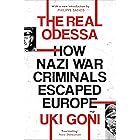| Digital List Price: | $17.99 |
| Kindle Price: | $11.99 Save $6.00 (33%) |
| Sold by: | Amazon.com Services LLC |
Your Memberships & Subscriptions

Download the free Kindle app and start reading Kindle books instantly on your smartphone, tablet, or computer - no Kindle device required.
Read instantly on your browser with Kindle for Web.
Using your mobile phone camera - scan the code below and download the Kindle app.

OK
 Audible sample Sample
Audible sample Sample 


Useful Enemies: America's Open-Door Policy for Nazi War Criminals Kindle Edition
John “Iwan” Demjanjuk was at the center of one of history’s most complex war crimes trials. But why did it take almost sixty years for the United States to bring him to justice as a Nazi collaborator? The answer lies in the annals of the Cold War, when fear and paranoia drove American politicians and the U.S. military to recruit “useful” Nazi war criminals to work for the United States in Europe as spies and saboteurs and to slip them into America through loopholes in U.S. immigration policy. During and after the war, that same immigration policy was used to prevent thousands of Jewish refugees from reaching the shores of America.
The long and twisted saga of John Demjanjuk, a postwar immigrant and auto mechanic living a quiet life in Cleveland until 1977, is the final piece in the puzzle of American government deceit. The White House, the Departments of War and State, the FBI, and the CIA supported policies that harbored Nazi war criminals and actively worked to hide and shelter them from those who dared to investigate and deport them.
The heroes in this story are men and women such as Congresswoman Elizabeth Holtzman and Justice Department prosecutor Eli Rosenbaum, who worked for decades to hold hearings, find and investigate alleged Nazi war criminals, and successfully prosecute them for visa fraud. But it was not until the conviction of John Demjanjuk in Munich in 2011 as an SS camp guard serving at the Sobibor death camp that this story of deceit can be told for what it is: a shameful chapter in American history.
Riveting and deeply researched, Useful Enemies is the account of one man’s criminal past and its devastating consequences, and the story of how America sacrificed its moral authority in the wake of history’s darkest moment.
- LanguageEnglish
- PublisherDelphinium Books
- Publication dateJanuary 22, 2013
- File size2677 KB
Customers who bought this item also bought
Editorial Reviews
Review
“Useful Enemies is a remarkable and riveting account of how good people in a great nation can do very bad things and fail to do good things. This is a terrifying account of the triumph of injustice in the false name of pragmatism and in the immoral service of bigotry.” —Alan Dershowitz
“Essential reading for anyone interested in understanding a difficult chapter in American history.” —Ambassador Stuart E. Eizenstat
About the Author
Product details
- ASIN : B00ARQXXE2
- Publisher : Delphinium Books; Reprint edition (January 22, 2013)
- Publication date : January 22, 2013
- Language : English
- File size : 2677 KB
- Text-to-Speech : Enabled
- Screen Reader : Supported
- Enhanced typesetting : Enabled
- X-Ray : Not Enabled
- Word Wise : Enabled
- Sticky notes : On Kindle Scribe
- Print length : 864 pages
- Best Sellers Rank: #675,066 in Kindle Store (See Top 100 in Kindle Store)
- #155 in History of U.S. Immigration
- #486 in Add Audiobook for $3.99 or Less
- #898 in Jewish History (Kindle Store)
- Customer Reviews:
About the author

RICHARD RASHKE is a lecturer and author of non-fiction books including Stormy Genius: The Life of Aviation's Maverick Bill Lear, Useful Enemies: John Demjanjuk and America's Open Door Policy for Nazi War Criminals, Escape from Sobibor, and The Killing of Karen Silkwood. Rashke is featured in the award-winning international television series Nazi Hunters. His works have been translated into eleven languages and have been the subject of movies for screen and television. A produced screenwriter and playwright, his work has appeared on network television and off-Broadway. He is also an alto sax player and composer. His latest composition, Crane Wife, a family musical based on a Japanese folktale, was performed at the Kennedy Center, and a new play, Dear Esther, based on a Sobibor prisoner, will open in 2013. He lives in Washington, D.C. www.richardrashke.com
Customer reviews
Customer Reviews, including Product Star Ratings help customers to learn more about the product and decide whether it is the right product for them.
To calculate the overall star rating and percentage breakdown by star, we don’t use a simple average. Instead, our system considers things like how recent a review is and if the reviewer bought the item on Amazon. It also analyzed reviews to verify trustworthiness.
Learn more how customers reviews work on Amazon-
Top reviews
Top reviews from the United States
There was a problem filtering reviews right now. Please try again later.
Where to begin? It is primarily the story of the trials and history of one John Demjanjuk, a Ukrainian Soviet soldier and German POW whose fate it was to be drawn into the service of the Nazis. He emigrated to the US and his involvement in concentration camp operations was ultimately discovered. His trials in the US, in Israel and in Germany are singular and astonishing. This is courtroom drama at its finest and Rashke's factual yet colorful retelling gives it the quality of a bestselling novel. Once you get into the story, you will be compelled to read and read to the bitter end, as I am doing. The moral dilemmas posed by his situation and accusers are profound. There is really too much material to get into and other reviewers have done an excellent job describing it.
The circumstances surrounding the Demjanjuk trial -- how he and other Nazi collaborators were able to get into the US in the first place -- make up another part of the book that is just astounding. After the first couple chapters, I was overwhelmed and I was forced to put the book aside for about a month to absorb what I'd read. I simply DID NOT KNOW ANYTHING about the CIA, FBI or INS. I DID NOT KNOW the true history of post-WW II immigration to the US. I was taught some sloppy stuff about how we opened our doors to concentration camp victims and other European refugees made homeless and penniless by WW II. Well. I stand corrected, shocked and flabbergasted by the truth of these matters. Since this book is incredibly well researched, I have little room for skepticism. After this book I am going to read Blowback by Christopher Simpson to get more information.
Truth is stranger than fiction.
I was once in the home of an Operation Paperclip medical examiner in Maryland. It was like walking into Bavaria. Even 35 years after the war, he was no more Americanized than when he left Germany.
Now, for the author and the telling of the story... I listened to the audible version and the narration was excellent considering the difficulty of pronouncing all the ethnic names and the shear magnitude of detail presented. On occasion, I did wish I could see the spellings of persons and places, although this may not have helped. Prospective readers should know that there is a huge amount of research that is included in this book and consequently a lot of detail. Add to that the many detailed episodes describing the court trials of John D and this may deter all but those most interested. Detail regarding former Nazi POW and "death" camps was sometimes gruesome, but necessary background to the theme of the book. For this reviewer, it was more than interesting - it was fascinating. A well known aphorism seems to describe my feelings after reading this book... "Justice is like a greased pig; it squeals loudly, but is hard to catch".
The trials of John Demjanjuk in the US and Israel, in each of their many stages, give the author an opportunity to go deeper into the things that the FBI, the CIA, and the State Department are hiding. Demjanjuk himself is a small fish in a huge catch of Nazis and their collaborators, men brought into the US for expertise in areas as diverse as creating better machine guns and rockets to operating spy rings in Central and Eastern European lands now dominated by Stalin's USSR. One can make a case that some of these men had secrets important enough to justify bringing them in and hiding their unsavory pasts, but if the government were forced to give up documents that could have exonerated this low-level, Ukrainian POW turned Sobibor death camp guard, the larger picture would have been revealed.
"Useful Enemies" is a book you will keep reading because it is riveting. The manner in which both the prosecution and defense arguments at each of the trials are developed is especially effective, as are the epilogues to each major section of the book where the broader background of the deceptions is revealed. It turns one's stomach to realize that American policies were crafted to make it easy for "valuable" Nazis to gain entrance to the US, while Jewish survivors of death and labor camps were kept out.











